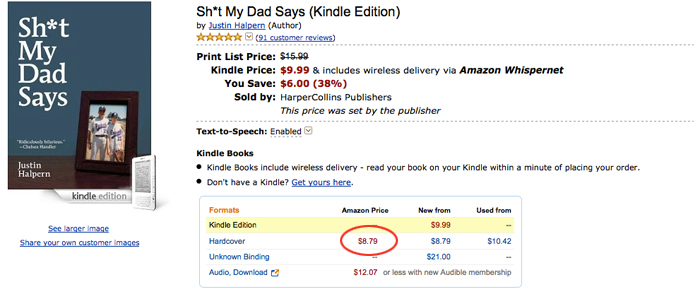Have you ever seen Shit My Dad Says on Twitter? Check it out. Go ahead. I’ll wait. Really funny stuff. Justin Hepburn, who set up the account as a place to share his father’s snippets of wisdom, currently has 1.4million followers, a TV deal, and a new book which is a collection of stories and essays (also called Sh*t My Dad Says).
I’ve checked out the preview on Amazon for the book and decided that it was something that would make for a quick and fun summer read.
I also picked up an iPad a few weeks ago and have been very impressed by how many things I use it for (full review coming next week). What I haven’t really spent a lot of time with is buying / reading full length books on it from the iBooks store. At the risk of not enjoying the experience, I figured Sh*t My Dad Says would be a good starter book.
However, the iBooks store currently doesn’t stock it. Not that big of a deal, right? I’ve heard that you can just grab a Kindle app and purchase / read any Kindle books on your iPad.
But here’s what I found when I went to Amazon to purchase the Kindle version:
Notice anything strange?
Here’s a quick observation on the difference between bytes and binding…
If you look hard, you’ll see that the new hardcover edition is priced at $8.79 and the Kindle edition (digital download) is $9.99. A brand new, hardcover book should NEVER cost more than an e-edition. Ever. Call me cheap, but the cost associated with moving a couple megabytes of text is infinitely smaller than the cost of printing and shipping a hardcover book. Never mind the antiquated royalty system between publishers and authors, I’m not going to touch that here. The whole purpose of e-readers is to (hopefully) do for reading what iTunes did for music (granted, there are some bad byproducts to this system as well) by making it convenient, instant, scalable, and cost effective.
But as the model stands right now, I think e-books in their current form and pricing structure are majorly flawed, no matter how cool the reading device is. Amazon is asking me to pay more for what is essentially the same experience as a paper book (without being able to share it with someone else when I’m done – another rant altogether).
Publishers need to either charge less because consumers recognize that there is substantially less cost involved with distribution and substantially more restrictions when it comes to sharing an e-book vs. a paper book – OR make the e-book a completely different experience than the paper book- one that is worth a premium price. How? I can think of a few ways:
- Ability to share chapters or the whole book with friends after completing it.
- The ability to annotate pages, add hyperlinks and share notes with everyone else who has bought that ebook.
- Enable book club style features where every reader can interact with other readers in real time through the book, commenting and suggesting other books.
- Allow for authors to have Q and As IN the book or allow users to peel back pages to see earlier drafts.
Things like this would differentiate the ebook experience, provide a kick ass way of interacting with other readers and essentially make each book come with its own built-in online community (not to mention sell a lot more Kindles, Nooks and iPads so more people could take part in that experience). Need more? Seth Godin has another awesome idea for a paperback Kindle.
Am I asking for too much here? Do you think the problem is that the tech is in its infancy at the moment, or do you blame the publishers (or authors)? Do you have an e-reader device and has it made you read more – if so, how would you weigh in on the pricing, buying experience? Fire away in the comments, please.







